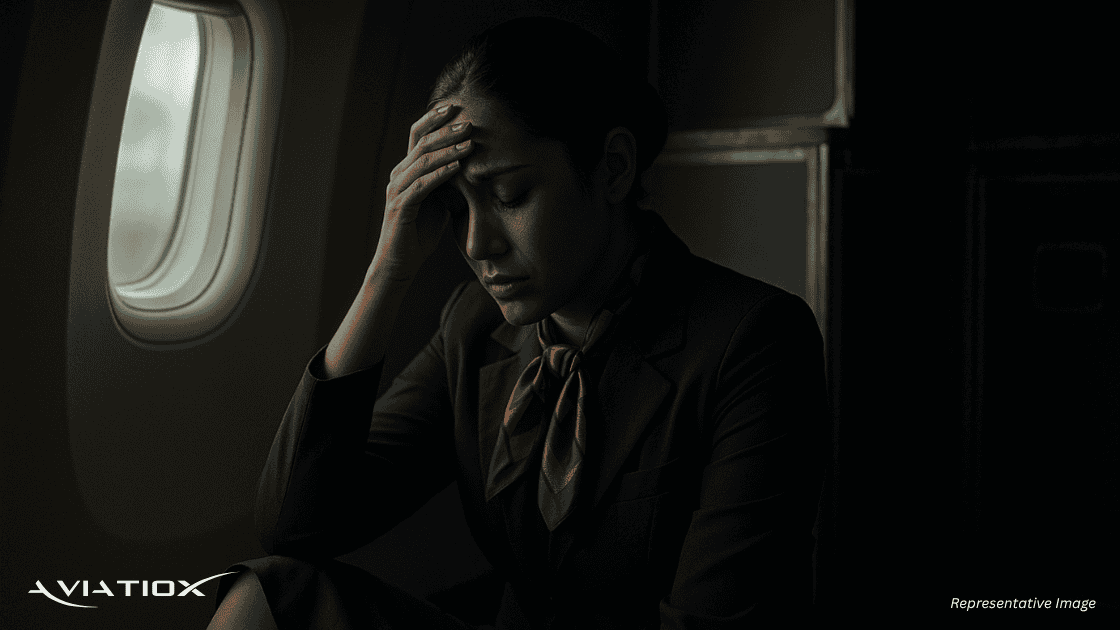She Flew, But Never Came Back": A Tragic Tale from the Skies That Demands Change

Inspired by actual events. Names, locations, and specifics have been altered to protect the identity of those involved.
There are stories in aviation that celebrate triumph — tales of resilience, courage, and achievement. But every once in a while, a story emerges that is not about celebration, but about loss. A loss so preventable, so deeply human, that it forces us to pause, reflect, and ask: Are we doing enough to protect the people who protect our skies?
This is one such story. A story that begins in the bustling corridors of a major international airline, winds through the sterile halls of duty rosters and fatigue reports, and ends — tragically — in a quiet hotel room in Miravale, a distant city far from home.
She was young. Dedicated. The kind of crew member passengers remember for her grace, calm demeanour, and professionalism. But behind the crisp uniform and the radiant smile was a body that was breaking — and a voice that didn’t feel safe enough to say: I’m not okay.
She had been unwell for days. Fever, fatigue, dizziness — signs no medical officer should ignore. Her leave had been extended, and she had rightly taken the time to rest.
But then came the call. According to those close to the incident, her reporting manager — rather than offering support — issued an ultimatum masked as a conversation. She was allegedly warned that further sick leave could lead to disciplinary action. Words like caution letter and warning were thrown around.
No one knows what went through her mind entirely. But what’s known is this: she logged in and declared herself fit.
Perhaps it was fear — fear of losing reputation, job security, or simply of being misunderstood. Perhaps it was guilt. Perhaps she had already been made to feel like her health was an inconvenience.
Within hours, she was pulled out for a long-haul international flight — a demanding route to Sydney, via a night departure. She reported to base with a body burning in fever, reportedly above 100°F.
Witnesses say she looked visibly ill, but she said nothing. She didn’t dare. What if she was blamed again? What if they said she was exaggerating?
She boarded the flight. She served passengers. She followed every SOP. She even smiled. Her colleagues noted nothing seemed too wrong, at least on the surface. She carried the invisible burden of pretending to be okay — a burden so many crew members carry when the system around them prioritizes compliance over care.
After the flight, she returned to her hotel room in Sydney — exhausted, dehydrated, and likely still running a high fever. The next morning, when she didn’t respond to her wake-up call, her roommate raised the alarm. They found her unresponsive in her bed.
She was declared dead on arrival at the nearest hospital.
The room was silent. The world moved on. But a life was lost. A future erased.
A Systemic Reflection
What failed her?
The policies on paper? Or the culture that interprets them with cold detachment?
The lack of medical checks before duty? Or the fear instilled in staff to never speak up, lest they be seen as liabilities?
The truth is, aviation runs on discipline, yes — but it must also run on dignity. On empathy. On care.
Crew members are not machines. They are human beings. They face jet lag, time zone disorientation, constant social interaction, and physical fatigue — all while being expected to smile, serve, and stay alert.
When an employee says they are unwell, that voice must be honored. Not doubted. Not threatened. Not silenced.
A Quiet Goodbye
Her family never got to say goodbye in person. She passed away in a foreign land, in silence.
Her friends and colleagues are still processing the grief. The guilt. The questions.
She should have never taken that flight. And yet she did. Because the cost of saying "no" felt heavier than her own wellbeing.
This blog is not written with anger, but with urgency.
Let this be a wake-up call.
Let us relook at our wellness policies. Let us build systems where no crew member is afraid to say they are sick. Let us train our managers not just to enforce rules, but to protect people.
In Memory of a Life Lost Too Soon
Miravale, Sydney Sector – September 2024
"You flew through the skies with grace. May you now rest with the peace you were denied."
Disclaimer
This blog is inspired by actual events shared confidentially. Names, flight details, and locations have been modified to preserve anonymity. The intention of this post is not to accuse, but to advocate — for systemic reform, for human-centered leadership, and for a culture of care in aviation.